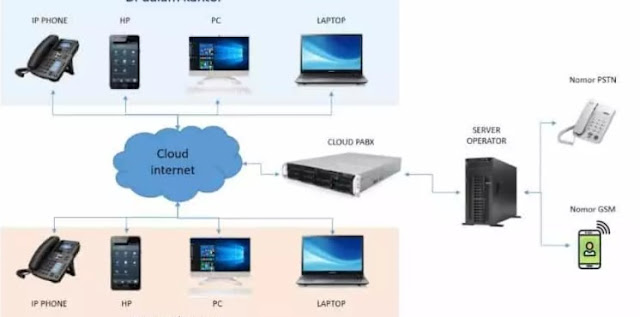Ip phone is a telephone system in the form of hardware that uses an internet connection to send and receive voice data. Unlike ordinary telephones that use landlines to transmit analog signals, the function of an Ip phone is to make telephone conversations over the internet using a router or modem.
The first publicly available IP phones arrived on the market in early 1995. However, compared to standard telephone systems, the audio quality was low and they were very expensive.
Since then, internet-based telephone technology has developed rapidly. IP phones now offer HD voice quality, lower operating costs, and advanced business phone features.
And the need for upfront investment is almost non-existent.
In this article we will give you full details about Ip phone.
Contents
How do Ip phone systems work?
Ip phone systems use Internet Protocol (IP) or other digital protocols to transfer voice communications over the internet.
If you are using an IP PBX system, the data is digitally transferred on a Local Area Network (LAN), and then converted into an analog voice signal and sent to the PSTN.
However, due to high hardware and installation costs, IP PBX is no longer the leading solution.
Hosted VoIP has become the most popular Ip phone solution. This allows businesses to take advantage of advanced PBX features without installing on-site hardware.
Here is a breakdown of how a VoIP system works:
With hosted VoIP, your IP phone sends digital data over the internet to your provider. Your provider handles call routing, call queuing, and everything else in the cloud.
You can also use SIP trunking to connect legacy IP PBXs to modern VoIP providers to take advantage of missing features.
What is the Difference Between VoIP and Ip phone systems?
The terms are often used interchangeably, but there is a slight difference between the two.
Ip phone is an internet-based hardware device as a medium for communication both for voice and video.
VoIP is an internet protocol that can be used to communicate with voice media.
Initially, the term VoIP (Voice over Internet Protocol) was more specific. It simply refers to the technology used to make and receive telephone calls over the internet.
However, in recent years, even VoIP providers and telecommunications companies have started to use these terms interchangeably. Ip phone and VoIP both include telephone systems that use a LAN (local area network) to connect to the internet via a modem/router.
See other articles:
VoIP Protocols and Audio Codecs
Ip phones rely on various open source protocols to transfer data from the phone to the service provider.
Here are the three most common:
- SIP protocol,
- H.323 protocol,
- RTP/RTCP protocol.
The protocol an IP phone uses depends on how your phone system is set up as well as your VoIP provider.
To send voice data effectively over the internet, you need a way to compress and decompress it.
And, because phones stream data in real-time and the focus is on the human voice, they can’t use common codecs like MP3.
Most Ip phone service providers, including Artatel, use codes such as:
- a. G.711μ law f. G.723,
- b. G 711a law h. AMR,
- c. G 722 i. GSM,
- d. G 729 j. iLBC,
- e. G729 a k. OPUS,
- f. G729 b,
- g. G729ab,
Benefits of an ip phone systems for small businesses
VoIP telephony can lower your telephone costs by up to 60% with the same quality as PSTN.
Why are so many businesses switching?
There are several main benefits.
1. Up to 60% Cheaper than Landlines
For starters, VoIP is significantly cheaper than traditional business plans.
Switching to an unlimited VoIP plan can save up to 60% over comparable business landline plans.
2. More Features Without Extra Hardware
IP phones also allow your business to access advanced features without having to invest in additional hardware.
For example:
- Call forward,
- Auto attendant,
- Music Hold,
- Call Pop,
- Voice recording,
- Short message,
- Call or video conference.
With Artatel, you can choose an advanced enterprise plan that includes all VoIP features or upgrade your plan to your needs.
3. Easy Integration with CRM and Other Business Tools
VoIP also makes it easier to integrate voice communications with CRM and other business tools.
The ability to centralize data and provide consistent customer service across multiple channels (at a lower cost) has made Ip phone and VoIP a no-brainer for many businesses.
What Do I Need to Use Ip phone?
In the early days of VoIP, you needed expensive onsite hardware like VoIP gateways and PBX servers.
But times have changed. With a hosted VoIP service like Artatel , the requirements are minimal or if you still want to keep your old PABX, Artatel can also provide an integration solution.
To find out if you have a good enough internet connection, you can read more about how much data VoIP uses.
Save Big On Monthly Bills By Switching to VoIP
Want significant cost savings and a new, more powerful phone system with advanced PBX features?
Check out other designs directly from your cellphone via WhatsApp Channel: https://whatsapp.com/channel/0029VaASACYFXUuYULZWe939.

